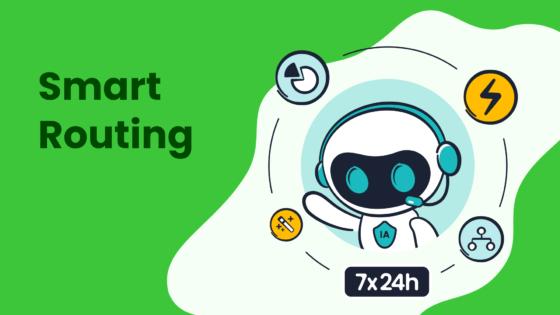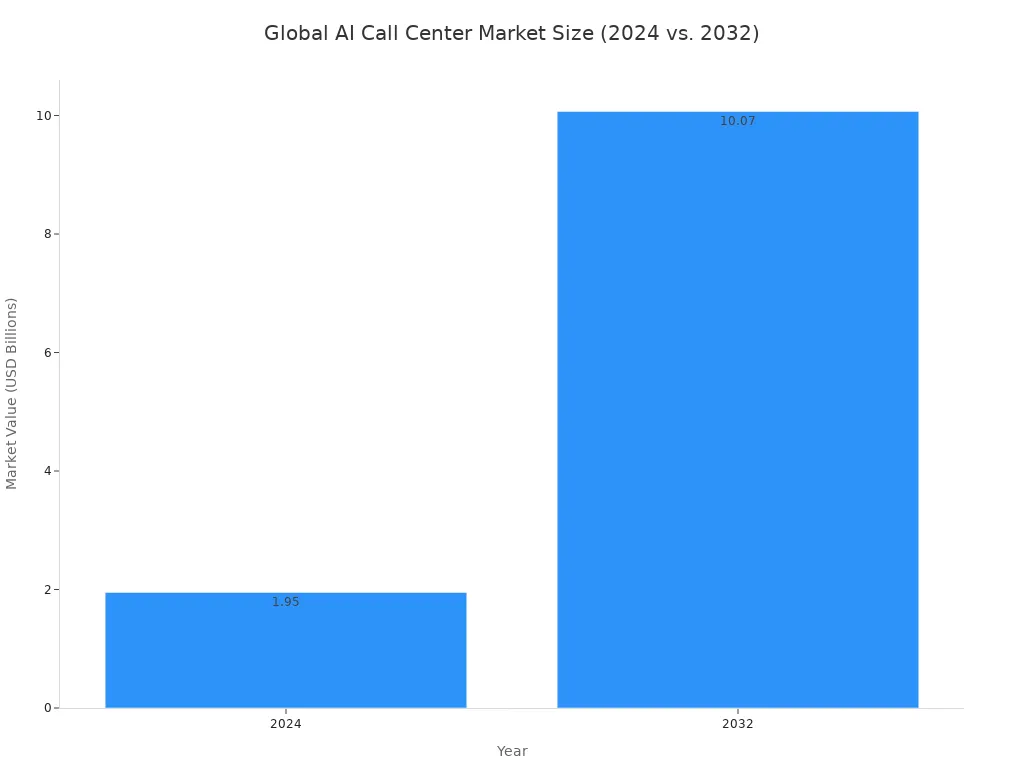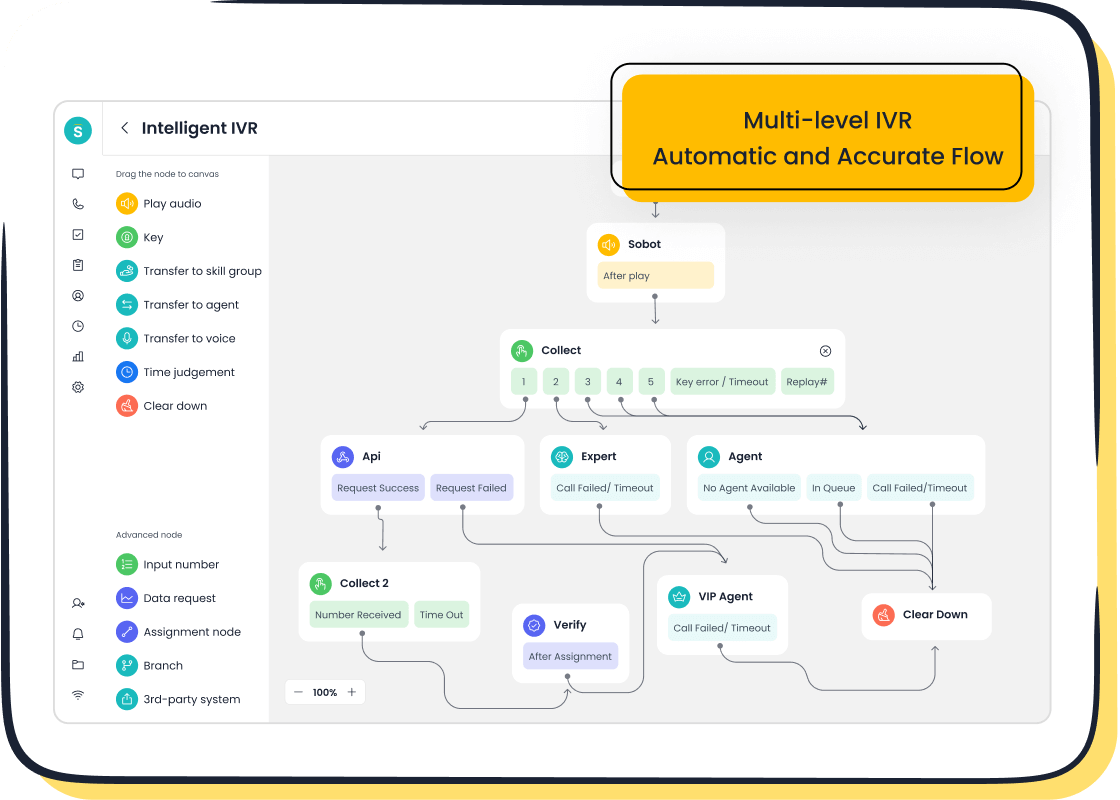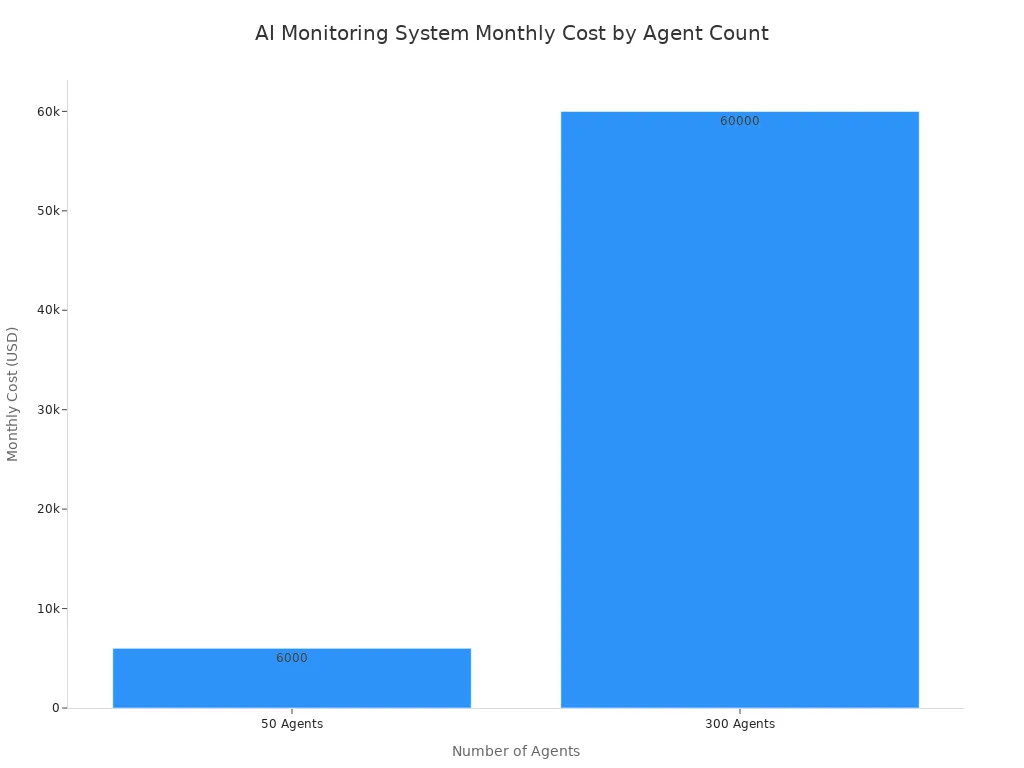The Good and Bad of AI Call Center Monitoring

You see the massive potential of AI for your call center. The global AI call center market is growing rapidly, showing how many leaders are exploring this technology.

A call center monitoring system offers clear benefits, from greater efficiency to powerful data insights. However, you must weigh these benefits against the risks. A poor AI strategy can make a customer feel unheard. The Sobot AI platform for the Sobot call center helps you find the right balance.
The Good: Why Use an AI Call Center Monitoring System?

Adopting an AI call center monitoring system offers powerful benefits for your business. You can transform your operations from a cost center into a value-driving engine. The right AI strategy enhances your team's capabilities and improves the customer experience. Let's explore the key advantages.
Boost Productivity with AI Automation
AI automation is one of the most significant benefits for any call center. It handles repetitive, time-consuming tasks. This frees your agents to focus on complex customer issues that require a human touch. AI can automate post-call work, categorize tickets, and even handle entire interactions.
Industry examples show just how powerful this can be.
- One company used AI automation to process 10,000 claims submissions per week. This change freed up over 75 full-time employees from repetitive work.
- Vodafone Germany found that its AI voice assistant could fully handle 40% of customer service calls, improving efficiency and customer satisfaction.
This level of automation dramatically improves key metrics.
| Metric | Traditional Method | With AI ✨ |
|---|---|---|
| Average Speed of Answer | 6.9 seconds | Instant |
| Average Hold Time | 69.4 seconds | Eliminated* |
| Average Talk Time | 2.6 minutes | Reduced* |
| After-Call Work | 43.6 seconds | Automated |
*Performance gains are achieved by AI's ability to instantly access and utilize client data to resolve issues, often eliminating holds and shortening conversations.

With Sobot, you can implement AI automation through features like our AI-powered Voicebot and intelligent IVR. These automation tools provide 24/7 customer support for routine questions. This allows your agents to dedicate their time to high-value customer interactions, boosting overall team productivity.
The Role of AI in Customer Support
The role of AI in customer support goes beyond simple automation. AI-powered technologies act as a copilot for your agents, providing real-time assistance that helps them resolve issues faster and more accurately. This leads to a better experience for both your agents and your customers.
AI helps reduce Average Handle Time (AHT) in several ways:
- Smart Call Routing: AI identifies a customer's needs and directs them to the right agent, reducing transfers and wait times.
- AI Assistants for Agents: These tools offer real-time tips and information during calls, helping agents find answers without placing a customer on hold.
- Automating Post-Call Tasks: AI can automatically generate call summaries and update customer records. This automation frees agents to move to the next call more quickly.
These systems provide agents with AI-suggested responses and automated ticket summaries, giving them the context they need instantly. Sobot's unified workspace brings all customer data and communication channels into a single view. This eliminates the need for agents to toggle between screens, giving them the tools for effective real-time assistance and enhancing customer experience. The importance of AI in customer service lies in its ability to empower your team to deliver exceptional service.
Gain Data-Driven Performance Insights
You cannot improve what you do not measure. A key benefit of an AI call center monitoring system is its ability to capture and analyze vast amounts of data from your customer interactions. This data gives you clear, actionable insights into agent performance, customer satisfaction, and operational efficiency.
AI can track critical KPIs that are difficult to monitor manually:
- Average After Call Work Time (AWT): See how much time agents spend on wrap-up tasks and find opportunities for more automation.
- Occupancy Rate: Monitor agent workload to prevent burnout and ensure proper staffing levels.
- Customer Churn Rate (CCR): Identify service trends that may be causing customers to leave.
One of the most powerful features is AI-driven sentiment analysis. This AI-enabled technology analyzes the emotional tone of a customer's voice and word choice. It helps you understand how customers truly feel during an interaction. You can use this data to:
- Identify coaching opportunities for agents.
- Address negative trends before they escalate.
- Recognize top-performing agents who consistently create positive experiences.
Sobot's real-time monitoring and analytics dashboards make this data accessible. You can track performance, analyze customer sentiment, and make informed decisions to improve your customer support services and the overall customer experience.
Reduce Long-Term Operational Costs
While there is an upfront investment, AI call centers ultimately lead to significant long-term cost savings. The efficiency gains from AI automation directly translate into lower operational expenses. Your team can handle more interactions without needing to expand headcount. This makes your call center more scalable and cost-effective.
AI also reduces costs associated with agent training. AI-powered platforms can guide new hires through workflows and provide real-time feedback, reducing ramp-up time by up to 30%. This customer service automation ensures your team becomes productive faster.
The benefits are clear in real-world applications.
Agilent, a global leader in life sciences, partnered with Sobot to implement AI automation. They achieved a 6x increase in service efficiency, a 25% reduction in operational costs, and a 95% customer satisfaction score.
By providing 24/7 customer support with AI-powered chatbots and intelligent routing, Agilent reduced the workload on human agents. This allowed them to focus on high-priority tasks, demonstrating the financial benefits of a well-integrated AI strategy. The importance of AI in customer service is not just about enhancing customer experience; it's also about creating a more sustainable and efficient operation.
The Bad: Common Challenges with AI
While the benefits are compelling, you must also navigate the potential downsides of AI in a call center. These challenges are not roadblocks but hurdles that require a thoughtful strategy. Understanding these risks is the first step toward building an AI-powered operation that is both efficient and human-centric.
Loss of Human Touch and Empathy
One of the biggest concerns with AI call centers is the potential loss of the human touch. While AI excels at processing data and handling routine tasks, it cannot replicate genuine human empathy. When customers face complex or emotional issues, they often want to speak with a person who can understand and connect with them.
In fact, research shows that the number one frustration for customers is the inability to reach a human agent. This is especially true for sensitive situations.
- Over two-thirds of customers report having a bad chatbot experience.
- 86% of customers prefer interacting with a human when they have a complaint.
A poorly implemented AI can make customers feel unheard and unimportant. For example, one company’s chatbot, designed to handle complaints, used impersonal responses that only increased customer frustration. This led to a decline in trust. For complex problems, many people still prefer a human.
| Demographic | Preference for Human Agents (Complex Issues) |
|---|---|
| Baby Boomers | 60% |
| Gen X | 55% |
This data shows that while AI is a powerful tool, it cannot completely replace the need for human interaction in your call center.
High Upfront Investment and Complexity
Implementing a comprehensive AI call center monitoring system requires a significant upfront investment in both time and money. You must budget for software licenses, implementation fees, and potential hardware upgrades. The costs can scale quickly depending on the size of your team.

Beyond the financial cost, you will face technical complexity. Integrating a new AI platform with your existing systems, especially older legacy CRMs, can be a major hurdle. Successful AI deployment depends on several factors that many teams are not prepared for:
- High-Quality Data: AI systems need large amounts of clean, accessible data to learn and function effectively. Fragmented or poor-quality data will limit the AI's performance.
- Skill Gaps: Your team may lack the specialized expertise needed to deploy, manage, and optimize AI technologies.
- Scalable Infrastructure: AI workloads require significant computational power. Your current IT infrastructure may need upgrades to handle the demand.
These challenges highlight the importance of choosing a partner who can guide you through the complex integration process.
Agent Morale and Job Displacement Fears
The introduction of AI into the workplace often creates anxiety among employees. Your agents may worry about potential job displacement as AI takes over tasks they used to perform. This fear is not unfounded. Microsoft research shows that customer service is a role with high AI applicability, and some experts predict significant changes.
Projections show that employment for customer service representatives may decline by 5.0% by 2033. This narrative around job displacement can harm agent morale, reduce productivity, and create resistance to change. If your team believes AI is there to replace them, they will be less likely to embrace it as a tool to help them succeed. Managing this fear is critical for a successful transition to AI call centers.
Data Security and Ethical Risks
AI call centers collect and analyze massive amounts of customer data, which introduces significant security and ethical risks. You are responsible for protecting sensitive personal information, and failure to do so can result in severe legal and financial consequences.
You must comply with major data privacy regulations like GDPR in Europe and CCPA in California. These laws give customers rights over their data and require you to be transparent about how you use it. AI adds another layer of complexity.
- Consent Laws: Recording and analyzing calls with AI can be complicated. Some states require all parties to consent to being recorded, and using AI might be considered a 'second listener,' requiring extra disclosure.
- Data Protection: You must have robust security measures to protect sensitive data like financial or health information from breaches. Regulations like GDPR require Data Protection Impact Assessments (DPIAs) for high-risk AI processing.
- AI Bias: An AI model can inherit biases from its training data. If the AI is used for performance reviews or other evaluations, this could lead to unfair or discriminatory outcomes against certain employees or customers.
Navigating these ethical and legal challenges is essential for any business implementing an AI system in its call center.
Finding the Right Balance with Sobot
The challenges of AI are real, but you can overcome them with the right strategy. The goal is not to replace your human agents but to empower them. You can build one of the best AI call centers by creating a partnership between technology and people. This approach uses AI to handle repetitive work, freeing your team to deliver exceptional call center services. Sobot’s solutions are designed to help you achieve this perfect balance.
Integrating AI as an Agent's Copilot
The best approach treats AI as your agent's trusted copilot. This model uses AI to provide real-time assistance during customer interactions. Instead of replacing agents, the AI gives them the data and tools they need to solve problems faster. This strategy is one of the best practices for implementing AI.
For example, an AI copilot can listen to a call, understand the customer's issue, and instantly pull up relevant information from your knowledge base. This eliminates hold times and empowers your agent with the right answers.
Sobot's platform functions as this copilot. It provides real-time assistance within a unified workspace, giving agents instant access to customer history and suggested responses. This AI support helps your team deliver a better, more efficient experience.
Automating the Routine, Elevating the Human
A key principle of successful AI call centers is to automate the routine so you can elevate the human. You can use AI automation to manage simple, high-volume tasks that do not require empathy. This customer service automation frees your agents to focus on complex and emotional customer issues where they can make the biggest impact.
AI automation is perfect for tasks like:
- Answering frequently asked questions
- Booking appointments or reservations
- Providing order status updates
- Routing the customer to the correct department
This division of labor improves efficiency and enhances the customer experience. Your customers get instant answers for simple questions, and your agents have more time for meaningful customer interactions. This is a core benefit of customer service automation.
A Hybrid Model for Peak Performance
The most effective AI call centers use a hybrid model that combines AI automation with skilled human agents. This approach creates a powerful synergy. The AI handles the data-heavy, repetitive work, while your team manages the complex, empathetic customer interactions. This is one of the best practices for implementing AI.
Sobot's Omnichannel Solution is built for this hybrid strategy. It integrates all your communication channels—voice, chat, and email—into a single platform.
- An AI-powered chatbot can start a conversation on your website.
- If the issue becomes complex, the AI seamlessly transfers the customer and the entire conversation history to a human agent.
This ensures a smooth experience for the customer without forcing them to repeat information. This model leverages AI automation for efficiency while reserving your team's talent for high-value service, leading to peak performance and enhancing customer experience.
Choosing a call center monitoring system is not an all-or-nothing choice. You can gain the benefits of AI, like greater efficiency, without losing the human touch. The future of exceptional call center services lies in a strategic partnership. This is one of the most important future trends in call center AI. Your agents become 'experience orchestrators' who manage complex customer interactions with AI as their copilot. This approach creates a better customer experience. Sobot’s solutions are designed for this hybrid model, helping you balance the benefits of AI with the need for human connection in all customer interactions. This balance is a key part of future trends in call center AI. The future trends in call center AI point to a better customer service experience. The future trends in call center AI will improve your call center.
FAQ
How does AI call center monitoring improve agent performance?
AI call center monitoring gives you data on every interaction. You can use this data to identify coaching opportunities for your agents. The system provides real-time tips and automates tasks, helping your team work more efficiently and confidently.
Will AI replace my human call center agents?
No, the goal is to empower your agents, not replace them. AI handles routine tasks, which frees your team to focus on complex customer issues. This hybrid model uses AI as a copilot to support your human agents.
What is the first step to implementing an AI system?
You should start by identifying your biggest challenges. Do you need to reduce wait times or automate simple questions? Understanding your goals helps you choose the right AI tools. A partner like Sobot can guide you through this process.
How does AI ensure a good customer experience?
AI provides instant answers to simple questions 24/7. For complex issues, it routes customers to the right agent with their full history. This seamless process reduces frustration and shows customers you value their time.
See Also
Evaluating Top AI Solutions for Enterprise Call Centers
Elevate Call Center Performance Through Effective Monitoring Strategies
Your Comprehensive Guide to Call Center AI Software
